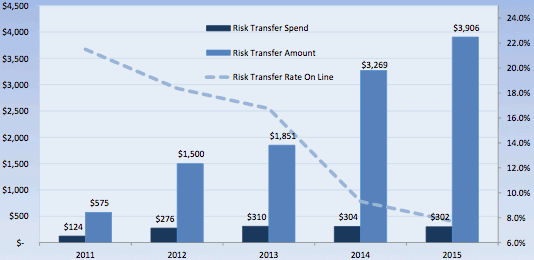The steep decline in rates and pricing for Florida wind property catastrophe reinsurance coverage can be plainly seen in information published by the states Citizens Property Insurance Corporation. Also published are the extent of the savings the insurer made in 2015.
Florida Citizens has been on a mission to become better protected in recent years, utilising increasing amounts of private market reinsurance protection along with capital markets backed coverage from its Everglades catastrophe bond series of deals.
Alongside its increased private market reinsurance and risk transfer protection, the property insurer has been downsizing through its depopulation program, resulting in many of its risks being passed back to private insurers who have also made use of reinsurance and cat bonds.
For Florida Citizens, the 2015 risk transfer purchase puts it in the best protected position it has ever been in, with the insurer now saying it can handle a 1-in-100 year hurricane without the need to levy assessments on Florida policyholders.
Citizens notes though that even with all this reinsurance protection, more actuarially sound rates for its customers and its depopulation program, should a major storm strike it could still need to use the assessment route to recover.
Hence, Florida Citizens said; “This is why Citizens is committed to transferring risk to global reinsurers, as reinsurance reduces assessment risk nearly dollar-for-dollar to the amount of reinsurance purchased.”
Citizens cites the “historically low rates-on-line” of private reinsurance and for reinsurance collateralized by the sale of catastrophe bonds as being key to its ability to transfer risk away from Florida policyholders.
Citizens explains exactly what these low rates meant for its 2015 reinsurance renewal; “Last year, Citizens transferred $3.27 billion of Coastal Account risk to private reinsurers at a net cost of $216 million. This year, Citizens transferred $3.91 billion of Coastal Account risk to the private sector at an estimated net cost of $200 million.”
So that’s an additional $640m of reinsurance and risk transfer protection, with a reduction in net cost of $16m in just one year. Quite a result for Citizens and a real indication of the steep rate decline seen in Florida reinsurance coverage.
However, the increased reinsurance protection plus the fact that Citizens Coastal Account now has a higher expected hurricane loss, due to the depopulation efforts, mean that the provision for reinsurance from its policies has grown. But that’s a small price to pay for the better state of protection for Florida policyholders.
The risk transfer story at Florida Citizens is one of rapid price declines, as catastrophe reinsurance pricing softened and insurance-linked securities (ILS) pricing through catastrophe bonds helped the insurer to become better protected while lowering its costs dramatically.
The 2015 risk transfer program of just under $3.91 billion represents an increase in coverage year-on-year of 20%, for $16m lower net costs, or $2m less spend on a total cost basis. The rate-on-line for the 2015 spend was 7.7%.
The chart below taken from a recent presentation at Florida Citizens shows the steep decline in risk transfer and catastrophe reinsurance rates experienced by the insurer.

Florida Citizens risk transfer and reinsurance rate development 2011 - 2015
It’s perhaps stunning to think that the effective rate-on-line has declined from around 21% in 2011 to 7.7% in 2015. Just what that means for Citizens can be clearly seen in the spend versus capacity, particularly if you look at 2013 when Citizens spent more on its risk transfer than in 2015, but received over $2 billion less protection as a result.
Steep price declines like that make it no surprise that the declines have slowed and perhaps look set to tail off. In fact, as our article earlier today showed, catastrophe bond spreads are now up on 2014 as the ILS market demonstrates its wish to put a stop to further steep declines in pricing.
As well as getting much more risk transfer for its money, double the amount over the last three years, Citizens has also managed to move its reinsurance program to be 72% aggregate coverage with coastal account protection projected to cover a 1-in-122 year storm.
The addition of catastrophe bonds and other collateralized covers backed by ILS and capital market investors has been a key trend that has enabled Citizens to become so well protected. It has also enabled Citizens to build a much more diversified risk transfer capital base. In fact Citizens added 11 new reinsurance markets to its 2015 program, some of which were likely additional ILS players.
Without the support of the capital markets and their ability to wield a lower cost-of-capital, catastrophe bonds dominate the program, it is perhaps unlikely that Citizens could have achieved such rate declines and ultimately savings.
The chart above should provide a clear demonstration that buying catastrophe risk transfer and reinsurance cover now should be advised for all re/insurers, as pricing like this may not be around forever.
Also read:
– Citizens puts in place $3.9B risk transfer for 2015, cat bonds dominate.
 View all of our Artemis Live video interviews and subscribe to our podcast.
View all of our Artemis Live video interviews and subscribe to our podcast.
All of our Artemis Live insurance-linked securities (ILS), catastrophe bonds and reinsurance video content and video interviews can be accessed online.
Our Artemis Live podcast can be subscribed to using the typical podcast services providers, including Apple, Google, Spotify and more.































